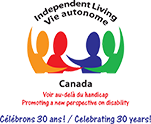This article was written by Philip Mills and Samantha Walsh and was originally posted on the Independent Living Centre for Waterloo Region (ILCWR) website here.
—
In the 28 years since the United Nations General Assembly proclaimed the first annual observance of the International Day of People With Disabilities, much has been done to recognize and promote the rights and well-being of persons with disabilities in all facets of our society and in our communities.
Still, the word ‘disability’ for many conjures the image of a person using a wheelchair. Despite the fact that many people with disabilities use assistive devices, this narrative leaves out a significant portion of people with invisible disabilities, including mental illness, chronic pain, seeing or hearing disabilities, and learning or cognitive disabilities.
According to 2017 Statistics Canada data, 22% of Canadians have at least one disability. That’s one in five Canadians, or 6.2 million people. The breakdown by disability shows that a significant proportion of these are invisible, including those related to pain (14.5%), mental health (7.2%), seeing or hearing (10.2%), and learning (3.9%).
Invisible disabilities highlight the immense difference between experience and stigma. It can seem like a person who uses a wheelchair is more disabled, and therefore the target of more stigma, because in a world designed for people who can walk, the barriers faced by someone using a wheelchair are evident. By contrast, someone’s experiences with dyslexia or anxiety will be less obvious to the casual observer, and are therefore viewed as less disabling.
However, disability has no hierarchy. A person’s experience with disability, regardless of complexity, is not determined by devices they may or may not use. The social model of disability looks at disability from a cultural standpoint, and focuses on the needs and experiences of people with disabilities while understanding that not every disability is going to be visible. It opposes the medicalized model that views disability as something to be diagnosed and treated. Indeed, the last institution in Ontario for people with developmental disabilities was only closed in 2009. With a history of institutionalization not far behind us, society is still working on wrapping its collective brain around looking at disability more holistically. We still cannot fathom that ‘disability’ is in fact created by a society that fails to consider that we are a diverse community of people who move through the world in different ways.
Disability is the only minority that is an open-ended category that anyone can join, and certainly the chances increase the longer we live. Yet, our discussions of accessibility and inclusion hardly go beyond the government-mandated minimum standards of installing ramps and elevators. In Canada, we still don’t have comprehensive disability legislation. Many of our public programs and policies are divisive, where only specific groups of people with disabilities are eligible for certain benefits or federal tax credits. People with invisible disabilities continue to face structural barriers to accessing programs and funding because they do not meet the strict eligibility criteria of narrow definitions of disability.
If we’re going to have meaningful conversations about inclusion, accessibility and universal design, it’s time we expanded our thinking about disability at the societal and government levels to include all people with physical, intellectual, social emotional and learning disabilities. This includes engaging people with invisible disabilities in our communities to help create a society that can include everyone. No matter how well-intentioned policies may be, we continue to build our communities in ways that ultimately exclude people from them.
We still have a long way to go. This is why the International Day of People With Disabilities on December 3rd is so important. It is the perfect opportunity for us to raise awareness of those living with invisible disabilities and to make our intentions of a more equitable, diverse and inclusive society a lived reality for those with disabilities.
Philip Mills is the Executive Director of the Independent Living Centre of Waterloo Region (ILCWR) and Samantha Walsh is ILCWR’s Director of Service and the Second Vice Chair of Independent Living Canada.
Read this Op-Ed in the Waterloo Region Record (November 27 issue)







